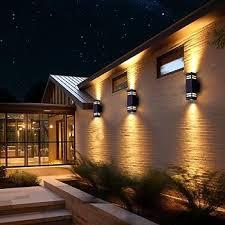Outdoor Lighting Market Insights, Technological Innovations, and Strategic Investment Opportunities Across LED, Solar, and Smart Lighting

The outdoor lighting market is at a pivotal moment of transformation. As demand surges for lighting solutions that are not only effective and durable but also energy‑efficient, smart, and sustainable, manufacturers and investors are looking for where the biggest opportunities lie. In this article, we’ll explore recent technological innovations and strategic investment areas in LED, solar, and smart lighting for outdoor applications.
Technological Innovations Shaping the Market
1. Next‑Generation LED Performance
LED technology continues to evolve with improvements in lumen output per watt, better thermal management, and refined optics. These advances enable brighter illumination with lower power consumption — particularly valuable for large public spaces, highways, industrial yards, and façade lighting. Another dimension is color quality and tunability: LEDs can offer flexible color temperatures and dynamic lighting effects, enhancing aesthetic appeal without compromising efficiency.
2. Solar Hybrid & Autonomous Lighting Systems
Solar‑powered outdoor lighting is becoming more reliable and versatile. New solar cell designs generate higher energy even under less-than-ideal sunlight; along with improved battery chemistries, this results in lights that maintain performance over longer durations. Hybrid configurations—solar paired with grid backup or energy storage—allow consistent operation in environments prone to bad weather or power fluctuation. Remote locations, parks, pathways, and off-grid infrastructure are particularly well served by these developments.
3. Smart & Connected Features
The “smart” in outdoor lighting is taking many forms: motion sensors, ambient‑light detection (day/night sensors), adaptive dimming, scheduling, and even integration into broader IoT or smart city platforms. Lights are now part of networks that allow remote monitoring, predictive maintenance, and usage data analytics. For instance, lighting systems can detect faults, schedule maintenance, or adjust output based on pedestrian or vehicle traffic, saving both energy and maintenance costs.
4. Durability, Weather Resistance & Materials Innovation
Outdoor lighting faces harsh conditions: rain, dust, temperature shifts, UV exposure. Innovation in materials (coatings, sealants), enclosure designs, ingress protection (water/dust resistance), and corrosion‑resistant fixtures are reducing maintenance needs. Innovations in lens design and heat dissipation also increase lifespan and reliability, especially for industrial and exposed outdoor applications.
Strategic Investment Opportunities
Given these technological advances, several investment paths appear promising:
A. Integrated Systems & Bundled Solutions
Rather than selling stand‑alone fixtures, investing in full systems—LED lamps + solar modules + sensors + smart controls + monitoring services—offers higher margins. Bundled offerings appeal to municipalities, large estates, resorts, campuses, and industrial parks that want turnkey, low-maintenance, high-performance lighting.
B. Retrofits & Upgrade Packages
Many outdoor lighting installations still use outdated, inefficient lighting (high pressure sodium, metal halide, or non‑LED). Retrofit kits or modular upgrade solutions that allow existing poles and housings to be reused, simply swapping in LED modules, adding sensors or solar hybrids, represent a large addressable market. The lower cost of incremental upgrades appeals to both commercial and residential segments.
C. Smart City & Municipal Contracts
Cities investing in smart infrastructure are increasingly including outdoor lighting in their plans—both for public safety, energy savings, and aesthetic enhancement. Suppliers who can deliver smart lighting systems that integrate with broader municipal IoT platforms (traffic, environment, public safety) are well positioned. Investment in compliance, certifications, and perhaps partnership with local governments or utilities enhances trust and contract success.
D. Energy Storage & Hybrid Solar Storage Innovations
Battery cost, longevity, and maintenance are often the limiting factors for solar outdoor lighting. Investments in energy storage innovations—longer‑life batteries, better charging/discharge cycles, lower cost materials—can yield competitive advantage. Similarly, hybrid systems that intelligently switch between solar, battery, and grid backup can reduce risk and improve uptime.
E. Smart Controls, Sensors & Analytics Services
Hardware alone is often not sufficient. Lighting systems that include remote monitoring, diagnostics, energy usage tracking, predictive maintenance, optimization algorithms, and user interfaces offer value beyond illumination. There is recurring revenue potential in software, maintenance contracts, or services tied to analytics platforms.
F. Niche & Aesthetic Segments
Architectural lighting, decorative landscape lighting, façade illumination, and lighting for hospitality, resorts, and premium residential properties place high value on aesthetics, color rendering, and design. LEDs allow for creative lighting effects with lower energy cost—investing in high quality, design‑oriented product lines can access premium price tiers.
Market Outlook & Key Challenges
While the opportunities are strong, certain challenges must be managed:
-
Upfront Cost vs Payback: Integrated LED + solar + smart systems have high initial costs. Demonstrating total cost of ownership (energy savings, maintenance reduction) is vital to winning contracts.
-
Standards & Interoperability: Different sensors, protocols, smart control systems may use proprietary formats. Ensuring compatibility, or supporting open/standard protocols, helps in large scale deployments.
-
Durability & Environmental Extremes: For outdoor, especially industrial or remote sites, extreme weather, dust, and corrosion impair fixture performance. Investment in rugged designs is non‑negotiable.
-
Maintenance & Lifecycle Management: Batteries age, sensors may drift, firmware/software may need updates. Organizations that invest in remote monitoring and predictive maintenance reduce unexpected costs.
-
Regulatory & Environmental Compliance: Light pollution controls, energy efficiency and safety regulations, standards for solar and battery systems—all vary regionally. Staying ahead of regulation is necessary.
Conclusion
The outdoor lighting market is rapidly evolving. LED, solar, and smart lighting technologies are no longer niche—they’re becoming central to design, infrastructure, safety, and sustainability. For investors and manufacturers, the best moves include offering integrated, high‑durability, smart systems; targeting retrofits; innovating in solar and battery storage; and capturing service‑based revenue through monitoring and analytics. Those who deliver systems that are efficient, reliable, and responsive to both regulatory and aesthetic demands will lead the next wave of market expansion.
- Art
- Causes
- Crafts
- Dance
- Drinks
- Film
- Fitness
- Food
- Juegos
- Gardening
- Health
- Inicio
- Literature
- Music
- Networking
- Otro
- Party
- Religion
- Shopping
- Sports
- Theater
- Wellness


